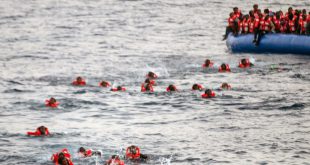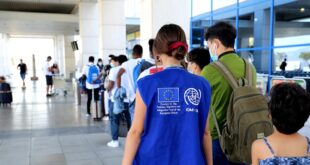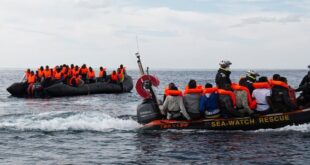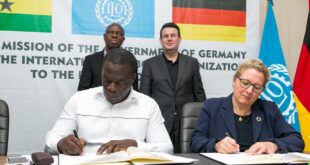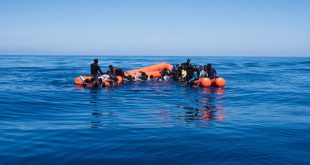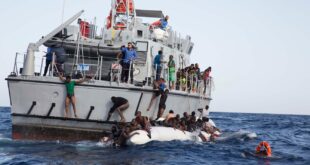A mini-summit on Africa is being hosted in Paris on Monday (28 August) on how to stem migration, reports Nikolaj Nielsen.
Heads of state and government from France, Germany, Italy, Spain, along with the EU’s foreign policy chief, Federica Mogherini, will meet with their counterparts from Chad, Niger and Libya.
The European Commission in a statement last week said that the summit will reaffirm the EU’s support for Chad, Niger and Libya in their efforts to manage migratory flows.
All three states are seen as key in broader plans to crack down on migrant smuggling and toughen up security throughout the volatile and often lawless North African region.
Although some 105,000 people have made the journey so far this year along the central Mediterranean route, over 2,200 are estimated to have died in the attempt, as more and more people begin to disembark from Morocco to Spain.
Far fewer people are leaving from Libya towards Italy when compared to earlier this year, amid reports of a Libyan coastguard firing warning shots at NGO rescue vessels.
Save the Children, Germany’s Sea Eye, and Doctors without Borders (MSF) recently suspended rescue operations in the Mediterranean due to reported clashes with the Libyan coastguard.
Five of the eight NGOs operating at sea refused to sign a controversial Italian-led code of conduct, which restricts their operations.
The Italian news agency Ansa reports the code is set to be signed by the leaders at the Paris summit.
Monday’s mini-summit is also likely to discuss Libya’s porous border with its southern neighbouring countries, given that the UN-recognised unity government, headed by Fayez al-Sarraj, has little control over large swathes of the oil-rich country.
Germany and Italy in May had called for tighter border controls, along with greater “technical and financial support” to Libyan authorities, with French president Emmanuel Macron later proposing to set up migrant processing centres in Libya.
Macron’s proposal was dismissed. Instead, both the United Nations and the International Organization for Migration (IOM) are stepping up voluntary returns of people caught up in Libya’s notorious migrant detention centres.
IOM’s chief, Lacy Swing, had earlier said the plan is to turn the detention centres into open reception centres where “people can come and go”. The conditions at the centres, many of which are run by militia groups, have been described as death traps.
The EU had also announced a €200 million package to finance projects around North Africa, geared towards migration in Libya.
The EU commission says around €90 million will go to stepping up the protection of migrants and reinforcing migration management in Libya.
More resources are also being poured into surveillance and cooperation with the Libyan coastguard as part of a so-called Seahorse Mediterranean Network.
The mini-summit comes ahead of the EU’s fifth Africa summit in November. The November summit aims to focus on youth, security, and economic development.
“Europe’s security and prosperity depends heavily on what is happening in Africa and with our relations with that continent,” an EU official told reporters earlier this year.
But while greater focus shifts towards Africa, reports are emerging that Turkey is allowing more and more people to leave to Greece.
Greek media outlet Kahtimerini, in an article on Sunday, cites unnamed government Greek sources saying that Turkey is deliberately allowing more people to disembark from its coast despite an EU deal to stem the flow.
The source told the paper that the increase in arrivals on the Greek islands is being used as leverage by Turkey on the European Union over stalled EU membership talks.
EUobserver
 THE AFRICAN COURIER. Reporting Africa and its Diaspora! The African Courier is an international magazine published in Germany to report on Africa and the Diaspora African experience. The first issue of the bimonthly magazine appeared on the newsstands on 15 February 1998. The African Courier is a communication forum for European-African political, economic and cultural exchanges, and a voice for Africa in Europe.
THE AFRICAN COURIER. Reporting Africa and its Diaspora! The African Courier is an international magazine published in Germany to report on Africa and the Diaspora African experience. The first issue of the bimonthly magazine appeared on the newsstands on 15 February 1998. The African Courier is a communication forum for European-African political, economic and cultural exchanges, and a voice for Africa in Europe.





